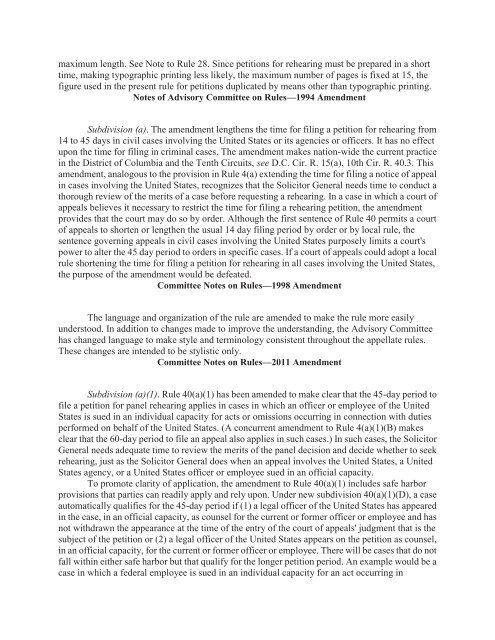Federal Rules of Appellate Procedure 2014-2015, 2014a
Federal Rules of Appellate Procedure 2014-2015, 2014a
Federal Rules of Appellate Procedure 2014-2015, 2014a
Create successful ePaper yourself
Turn your PDF publications into a flip-book with our unique Google optimized e-Paper software.
maximum length. See Note to Rule 28. Since petitions for rehearing must be prepared in a short<br />
time, making typographic printing less likely, the maximum number <strong>of</strong> pages is fixed at 15, the<br />
figure used in the present rule for petitions duplicated by means other than typographic printing.<br />
Notes <strong>of</strong> Advisory Committee on <strong>Rules</strong>—1994 Amendment<br />
Subdivision (a). The amendment lengthens the time for filing a petition for rehearing from<br />
14 to 45 days in civil cases involving the United States or its agencies or <strong>of</strong>ficers. It has no effect<br />
upon the time for filing in criminal cases. The amendment makes nation-wide the current practice<br />
in the District <strong>of</strong> Columbia and the Tenth Circuits, see D.C. Cir. R. 15(a), 10th Cir. R. 40.3. This<br />
amendment, analogous to the provision in Rule 4(a) extending the time for filing a notice <strong>of</strong> appeal<br />
in cases involving the United States, recognizes that the Solicitor General needs time to conduct a<br />
thorough review <strong>of</strong> the merits <strong>of</strong> a case before requesting a rehearing. In a case in which a court <strong>of</strong><br />
appeals believes it necessary to restrict the time for filing a rehearing petition, the amendment<br />
provides that the court may do so by order. Although the first sentence <strong>of</strong> Rule 40 permits a court<br />
<strong>of</strong> appeals to shorten or lengthen the usual 14 day filing period by order or by local rule, the<br />
sentence governing appeals in civil cases involving the United States purposely limits a court's<br />
power to alter the 45 day period to orders in specific cases. If a court <strong>of</strong> appeals could adopt a local<br />
rule shortening the time for filing a petition for rehearing in all cases involving the United States,<br />
the purpose <strong>of</strong> the amendment would be defeated.<br />
Committee Notes on <strong>Rules</strong>—1998 Amendment<br />
The language and organization <strong>of</strong> the rule are amended to make the rule more easily<br />
understood. In addition to changes made to improve the understanding, the Advisory Committee<br />
has changed language to make style and terminology consistent throughout the appellate rules.<br />
These changes are intended to be stylistic only.<br />
Committee Notes on <strong>Rules</strong>—2011 Amendment<br />
Subdivision (a)(1). Rule 40(a)(1) has been amended to make clear that the 45-day period to<br />
file a petition for panel rehearing applies in cases in which an <strong>of</strong>ficer or employee <strong>of</strong> the United<br />
States is sued in an individual capacity for acts or omissions occurring in connection with duties<br />
performed on behalf <strong>of</strong> the United States. (A concurrent amendment to Rule 4(a)(1)(B) makes<br />
clear that the 60-day period to file an appeal also applies in such cases.) In such cases, the Solicitor<br />
General needs adequate time to review the merits <strong>of</strong> the panel decision and decide whether to seek<br />
rehearing, just as the Solicitor General does when an appeal involves the United States, a United<br />
States agency, or a United States <strong>of</strong>ficer or employee sued in an <strong>of</strong>ficial capacity.<br />
To promote clarity <strong>of</strong> application, the amendment to Rule 40(a)(1) includes safe harbor<br />
provisions that parties can readily apply and rely upon. Under new subdivision 40(a)(1)(D), a case<br />
automatically qualifies for the 45-day period if (1) a legal <strong>of</strong>ficer <strong>of</strong> the United States has appeared<br />
in the case, in an <strong>of</strong>ficial capacity, as counsel for the current or former <strong>of</strong>ficer or employee and has<br />
not withdrawn the appearance at the time <strong>of</strong> the entry <strong>of</strong> the court <strong>of</strong> appeals' judgment that is the<br />
subject <strong>of</strong> the petition or (2) a legal <strong>of</strong>ficer <strong>of</strong> the United States appears on the petition as counsel,<br />
in an <strong>of</strong>ficial capacity, for the current or former <strong>of</strong>ficer or employee. There will be cases that do not<br />
fall within either safe harbor but that qualify for the longer petition period. An example would be a<br />
case in which a federal employee is sued in an individual capacity for an act occurring in


















